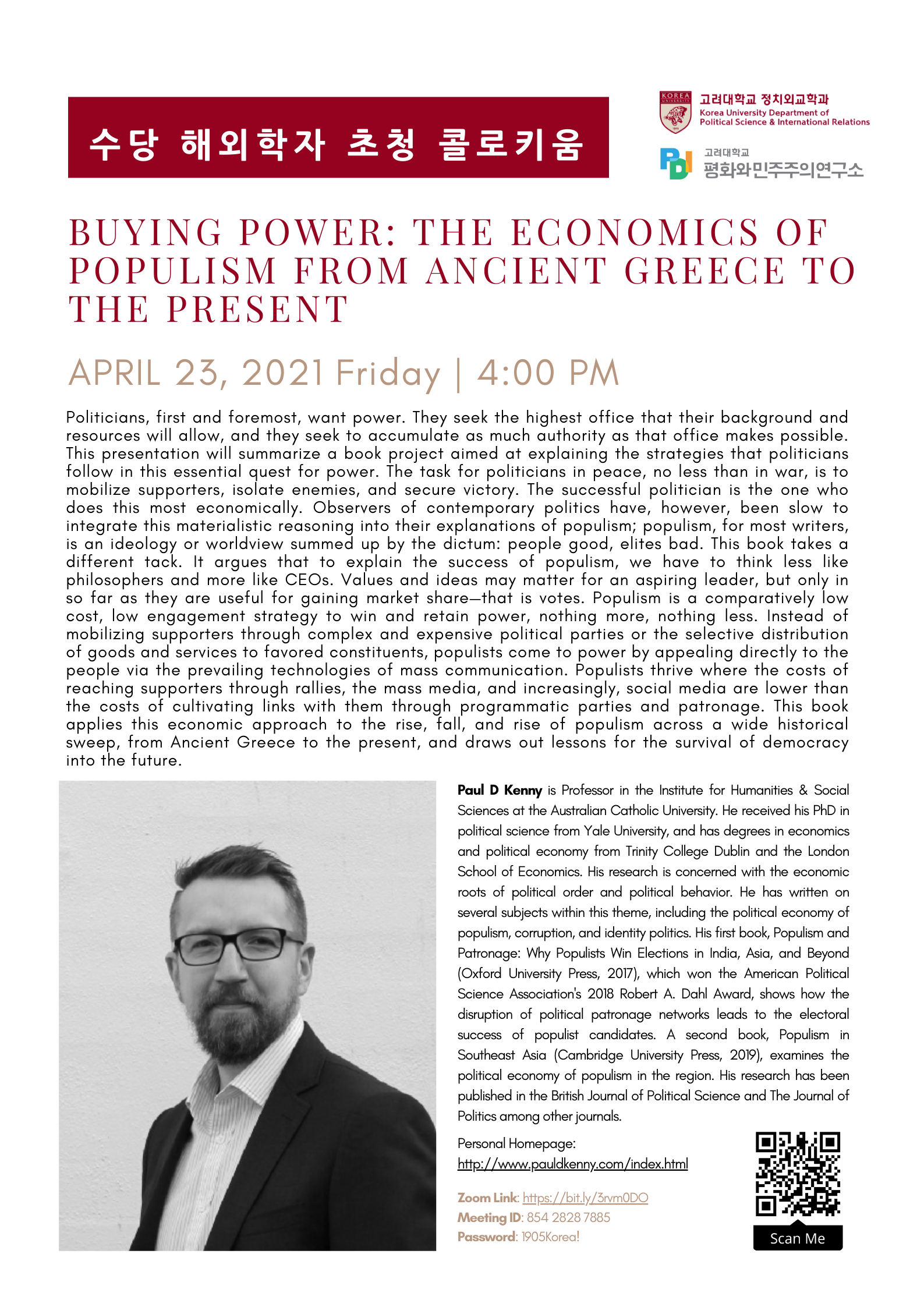 평화와 민주주의연구소는 정치외교학과와 공동으로 수당 해외학자 콜로키움을 개최합니다. 본 콜로키움은 온라인에서 진행하는 해외 정치학자 초청 강연 프로그램입니다. 2021년 4월 23일 금요일에 Australian Catholic University의 Paul Kenny 교수와 세미나를 개최할 예정이니 많은 분들의 참석 부탁드립니다. Paul Kenny교수는 "
Buying Power: The Economics of Populism from Ancient Greece to the Present"라는 제목의 저서를 발표할 예정입니다. 많은 참여 바랍니다.
평화와 민주주의연구소는 정치외교학과와 공동으로 수당 해외학자 콜로키움을 개최합니다. 본 콜로키움은 온라인에서 진행하는 해외 정치학자 초청 강연 프로그램입니다. 2021년 4월 23일 금요일에 Australian Catholic University의 Paul Kenny 교수와 세미나를 개최할 예정이니 많은 분들의 참석 부탁드립니다. Paul Kenny교수는 "
Buying Power: The Economics of Populism from Ancient Greece to the Present"라는 제목의 저서를 발표할 예정입니다. 많은 참여 바랍니다.
발표 : Paul Kenny (Australian Catholic University)
일시 : 2021년 4월 23일 (금요일) 오후 4:00
Zoom 링크 :
https://bit.ly/3rvm0DO
회의 ID : 854 2828 7885
암호 :
1905Korea!
기타문의 : jamessuh3823@korea.ac.kr
Abstract: Politicians, first and foremost, want power. They seek the highest office that their background and resources will allow, and they seek to accumulate as much authority as that office makes possible. This presentation will summarize a book project aimed at explaining the strategies that politicians follow in this essential quest for power. The task for politicians in peace, no less than in war, is to mobilize supporters, isolate enemies, and secure victory. The successful politician is the one who does this most economically. Observers of contemporary politics have, however, been slow to integrate this materialistic reasoning into their explanations of populism; populism, for most writers, is an ideology or worldview summed up by the dictum: people good, elites bad. This book takes a different tack. It argues that to explain the success of populism, we have to think less like philosophers and more like CEOs. Values and ideas may matter for an aspiring leader, but only in so far as they are useful for gaining market share—that is votes. Populism is a comparatively low cost, low engagement strategy to win and retain power, nothing more, nothing less. Instead of mobilizing supporters through complex and expensive political parties or the selective distribution of goods and services to favored constituents, populists come to power by appealing directly to the people via the prevailing technologies of mass communication. Populists thrive where the costs of reaching supporters through rallies, the mass media, and increasingly, social media are lower than the costs of cultivating links with them through programmatic parties and patronage. This book applies this economic approach to the rise, fall, and rise of populism across a wide historical sweep, from Ancient Greece to the present, and draws out lessons for the survival of democracy into the future.


